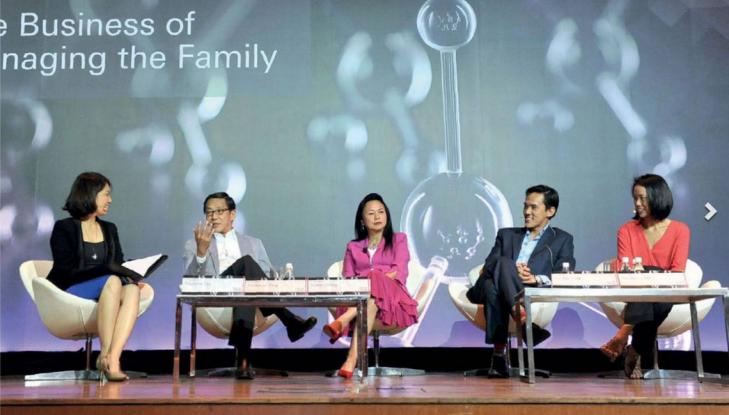
Managing a family business goes beyond analysing numbers to take into account the relationship between members, according to the recent HSBC Private Bank Family Enterprise Forum held in Singapore.
There's a received wisdom that business schools can teach the tenets of how to manage a business, but they can't teach the stewardship of a business. For family businesses, the makeup of relationships that transcend corporate and blood ties makes the process of business ownership - or stewardship- unique to each one. There are, however, some common truths that are revealed through the stories of those who have arrived at a particularly good recipe for a sustainable legacy across several generations.
Rob loannou, co-head of Global Private Banking for South-east Asia at HSBC Private Bank, feels though that, too often, the focus is on business rather than family. "A lot of the families we work with, focus on their business and making it successful, which they do well," he says. “They don't necessarily spend a lot of time thinking about the dynamics and business circumstances, family (members) can still have dinner together, and meet on weekends."
Prof Koh also asserts that businesses demonstrating a high degree of harmony show increased signs of entrepreneurialism and success in new markets or products. But, at the coalface of family businesses, how does the picture look and what are those families getting right?
To be one of Asia’s leading hotel and resort chains with four strong-minded family members at the helm would present a challenge at the best of times- though it is clear that the relationships among father, mother, son and daughter are mature, far-sighted and loving.
Father and owner of Banyan Tree Holdings, Ho Kwon Ping, takes a pragmatic approach to family dynamics, and is careful to distinguish between "owning" and "managing" the business.
Neither son nor daughter, had the conscious desire to join the Banyan Tree business when they were younger, but both recognised the value inherent in ensuring that the next generation is exposed to the workings of the company and their place in the family business. “Whether they become stewards of, or managers in, the business, they would have grown up within it, so it is truly part of the family," says son Ren Hua, executive director and country head for China, at Banyan Tree China Corporate Office. Mother Claire Chiang, who is senior vice-president of Banyan Tree Holdings, understood the need for her children to step away, but admits it was a struggle initially.
"We asked, why would you want to turn away? But it's because in entrepreneurial families, children are independent and tolerant, due to the way they were raised. They want to step away to prove themselves- to show they can excel in their field and come back.'" And come back they did.
Ren Hua was willingly pulled back by a sense of duty, and daughter Ren Yung felt able to play a key role in Banyan Tree, after successfully forging a socially motivated business of her own, Matter.
"What's really important is that the older generation or the parents always relate to the children as that, apart from their potential to join the business." says Ren Yung. "I always felt my parents supported me, in that regard, it was like an open conversation. . . so I therefore felt that the conversation was changing to where I was saying, I want to come back into the business. I've found a certain direction and I feel the freedom to apply that on this platform."
Michelle Lau, managing director and head of wealth planning for Asia at HSBC Private Bank, applauds this approach. "Banyan Tree is setting an example of a young family enterprise that has not only successfully carved a niche for itself but is also one where family values have permitted the business to flourish”.
But what are the challenges faced by those in a different business environment, and what's their approach? Philippe Bera is back in the family fold at Omtis Fine Wines after a high profile career in banking. He openly admits to feeling the pressure of being in his father's shadow something that kept him away for a long time. "'I spent about nine years in finance and I joined the family business not due to my father coaxing or forcing me, but because he adjusted the business in a way that made it Interesting for me and my background to fit in."
Bera also reveals how his father was very adept at planning for transfer over a 15-year period. "He was extremely transparent was actually shocked because I think a lot of families have this concept of both losing control and shocking the children with overwhelming numbers. But my father’s philosophy was that he just felt it was important to communicate and then discuss it." In Prof Koh's eyes, emotion plays a significant role. "The emotional dimension in a family business has positive influence on the business. I think he reason why family businesses are so unique is that being part of a family means that strong emotional bonds exist. So the, emotional dimension can be garnered and leveraged to be a positive part of the business” she says. '"I have seen families orchestrate this beautifully. They say, 'We have roles as a family and rules as a business':" This, says Prof Koh, gives them the freedom to make tough decision with love without bringing emotion into the business itseIf. A tricky balance to strike, but one which reaps much reward in the long term.
HSBC Private Bank is a division of The HongKong and Shanghai Banking Corporation Limited, which is incorporated in the Hong Kong SAR with limited liability.